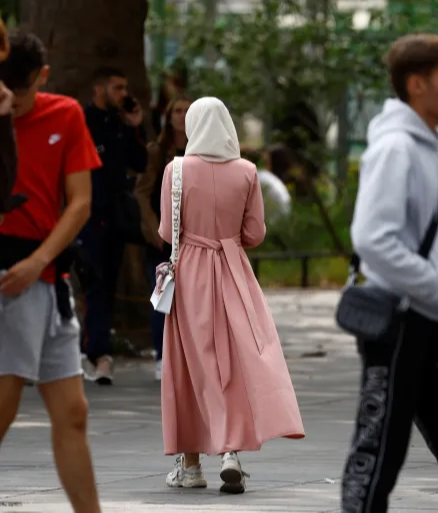
Paris, September 8 (RHC)-- French public schools have sent home dozens of Muslim girls refusing orders to take off their abaya, a loose garment worn by adolescent girls for decency. The French government announced late last month that it had banned wearing the abaya and the kameez -- its equivalent dress for men -- at public schools, claiming that the religious attire was contrary to French laws on secularism.
According to official figures, 298 girls - mainly aged 15 or more – who arrived for the first day of the new school year after the summer break were asked by schoolmasters to take off their abayas. Most of the girls consented to do so and take off their Muslim dress, changing into European-style clothing; however, dozens of the Muslim girls refused to change clothes and were forced to go back home by the schoolmasters, according to Education Minister Gabriel Attal in an interview with BFM broadcaster.
Attal noted that the teenage girls refusing to change clothes were given a notice addressed to their parents saying that “secularism is not a constraint, it is a liberty.” The minister warned that if these teens showed up again at school wearing the abaya dress there would be a “new dialog” with them.
French President Emmanuel Macron has defended the controversial measure, saying there was a “minority” in France who “hijack a religion and challenge the republic and secularism” with it. However, the French Council of Muslim Faith (CFCM), a national body encompassing many Muslim associations, has argued that items of clothing alone were not "a religious sign."
A complaint has been filed with the State Council, France’s highest court for complaints against state authorities, for an injunction against the ban on the abaya. Meanwhile, the new ban has been criticized by many politicians, who argue that loose, covering clothing is not a manifestation of religion and that students should not be excluded from classes because of their dress.
Clementine Autain of the left-wing opposition France Unbowed party denounced what she described as the "policing of clothing."
Attal's announcement was "unconstitutional" and against the founding principles of France's secular values and a sign of the government's "obsessive rejection of Muslims," she insisted. Under France’s laws on laïcité (secularism) -- introduced in March 2004 -- it is already forbidden to wear the Islamic headscarf in government buildings, including schools.
The law states: “The wearing of signs or outfits by which students ostensibly show a religious affiliation” in public schools, or at work by public officials such as teachers, firefighters, or police officers, is forbidden.
Analysts say French laws aiming to exclude Muslims from society are discriminatory against the five million members of France's Muslim community. They say the abaya ban is part of a series of measures taken by the French government to restrict the individual freedoms of Muslims.
Many Muslims have been forced to leave France due to the mounting social pressure, as a recent research report from the University of Lille shows. The report states more than two-thirds of the Muslims interviewed for the study said they left France to practice their religion freely, while 70 percent of them said they fled the country due to racism and discrimination.

